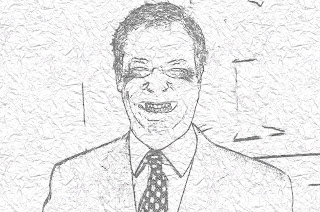"Mr Powell, who died in 1998, turned down Mr Farage’s request after giving the matter ‘very serious consideration’.
The following year, Mr Powell was invited to stand as a Ukip candidate in the 1995 European Parliament election, and then in the 1997 general election.
He rejected both requests. But he did go on to give his backing to three Ukip candidates in the mid-1990s.
Mr Farage has described Mr Powell as a ‘political hero’".
(It should be mentioned here that Russell Brand described Farage as a "Poundshop Enoch Powell").
It is not clear why Powell would not join UKIP, but there is one issue which united Farage and himself: Immigration - with one important difference. Powell, in his public statements, especially his infamous so-called "Rivers of Blood" (Powell never actually used the term) speech of April 20, 1968, focused upon immigrants from the former British colonies, who happened to have different coloured skin. Farage, on the other hand, has targeted EC migrants, who are predominantly white. Another difference between the two is that Powell's speech, and later ones, led to him being banished to the political wilderness. As Wikipedia points out:
" The Conservative leader, Edward Heath, sacked Powell from his post as Shadow Defence Secretary, telling him on the telephone that Sunday evening (it was the last conversation they would have). Heath said of the speech in public that it was "racialist in tone and liable to exacerbate racial tensions". Powell's later political career was spent in a sort of noisy obscurity.
Farage is still glowing with the success of the "Leave" campaign in the referendum, for which he takes a good deal of credit. If Powell were alive today, he would probably be wringing Farage's hand in congratulation. Unlike Powell, though, Farage does not seem to be heading for obscurity, even if he has resigned as the leader of UKIP. He is headed for a presenter's job with LBC and has been offered a huge amount of money to appear on "I'm a Celebrity, Get me Out of Here". He will thus avoid having to answer criticism for the imminent adverse effects of Brexit.
The major similarity between the two, in my opinion, is the way they both appealed to what can only be described as the racist section of the British electorate. This is not to say that Powell was, or Farage is, a racist. Powell explicitly denied it on a number of occasions, most famously to David Frost. As for Farage, even Ken Livingstone has defended him on this charge.
However, the racists among us, who lack subtle intelligence, have listened to the cunningly measured statements of both men, and heard something different. After Powell's speech of 20/4/68, dockers and Smithfield porters marched in support of him. Significantly, one march was led by Big Dan Harmston, a Smithfield market porter and lifelong member of Oswald Moseley's fascist Union Movement. Opinion polls showed a 74% approval of Powell's speech by white Britons, and for a time, Powell had a bodyguard squad of skinheads. For immigrant communities, it led to a heightened sense of insecurity and fear. Admiration of Powell persists on the far right to this day. He even has his own Facebook page (I refuse to provide a link), run by the "Traditional Britain Group."
Any casual observer can see that Farage has learned a lot from Powell. As the Guardian said in 2014:
"Farage has long openly admired Powell, once calling him his political hero. While acknowledging that Powell got it wrong about people of different nationalities and races being unable to mix, the Ukip leader has said the central thrust of Powell’s arguments about immigration hold true".
And Farage has not been slow to demonise EC migrants in much the same insidious way that Powell attacked coloured immigrant communities. As he himself said:
" It's about mass immigration at a time when 21% of young people can't find work. It's about giving £50 million a day to the EU when the public finances are under great strain."
That neatly implies that EC migrants are causing youth unemployment and cuts in public spending. It also lets the government and bankers off the hook. Worse, it sums up the way in which Farage and all the "Leave" big noises depicted EC migrants as invading parasites and enemies within. It comes as no surprise then, that post Brexit, racist hate crime has increased (a 50% increase in London alone) - and Farage has not said one word in condemnation. Powell never denounced the racist violence that followed his speeches, either. Farage has learned well from his hero. Ok, so you can't put released genies back in their bottles, but you could at least pretend to care about their misdeeds.
Nigel smiles; his hero hangs.




Powell said: "Like the Roman, I seem to see the River Tiber foaming with much blood." Not very far from "rivers of blood", I think.
ReplyDeletePowell was a complete hypocrite: as a minister of health, he told a delegation of nurses asking for a pay rise that he didn't need to pay them more because he could get as many cheap nurses from the Caribbean as he liked. He oversaw the importation of thousands of health professionals into the UK. I don't have a problem with that in itself (although the UK has never trained the number of doctors and nurses that we actually need - we just steal them from other, sometimes much poorer, nations); it's his later utterances opposing the immigration that he helped encourage that are sickening.
His 'principled' stance on immigration was a consequence of his not winning the Tory leadership, and an attempt to supplant his victorious opponent through racist populism. I was disgusted when Tony Blair paid tribute to him after he died.
This comment has been removed by the author.
ReplyDelete